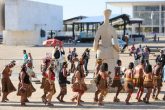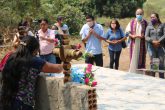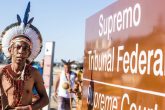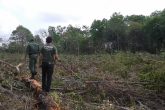Newsletter nº 1050: After 46 years Xavante get their land back, totally destroyed
By Luana Luizy,
Brasília
The invasion and occupation of the Indigenous Land Marãwasitsédé of the Xavante people by non-indigenous is over, after 46 years. It has taken 17 years of hard struggle and patience, but the Xavante people can finally return to the homeland from which they were expelled in 1966. The removal of the illegal squatters was completed on 27 January 2013. Says Chief Damian Padridzane: "We now want to recover the nature of our land that they (the squatters) destroyed."
Marãiwatsédé is located in the municipalities of Alta Boa Vista and São Felix do Araguaia, in the state of Mato Grosso.
According to the Department for Indigenous Affairs (FUNAI), the non-indigenous have been removed from the 619 points of occupation. During the process of withdrawal of the invaders, the National Institute of Colonization and Agrarian Reform (INCRA) signed up 235 families to participate in settlement projects in the region and the Federal Public Ministry of Mato Grosso will oversee the entire process. "The Funai has to be more firm and not give the opportunity for farmers and squatters to come back to invade our land again", argues Damian Xavante.
The task force of the Federal Government that executed the court ruling to evict the illegal settlers and that now maintains the safety of the area comprises staff of the General Secretariat of the Presidency, the Funai, the Incra, the Federal Police, the Federal Highway Police, the Centre for Operations and Management of the Amazon Protection System (Censipam), the National Security forces and receives logistical support from the Army.
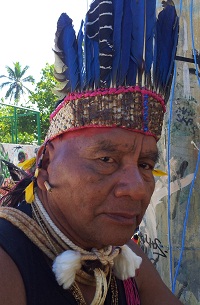 Threats
Threats
During the operation to remove invaders, the indigenous were constantly threatened, and suffered from aerial pesticide spraying to strong intimidations by the squatters. "In the city the threats continue, I personally have not been able to go there so far, but I never let them intimidate me, because we need to defend a right that is ours," tells chief Damian Xavante.
The illegal intruders have been threatening the indigenous ever after the Supreme Court (STF) ruled for the eviction of non-indigenous occupants on 18 October 2012, ordered by Judge Minister Carlos Ayres Britto, at that moment president of the STF. Even the retired bishop of São Felix do Araguaia, Dom Pedro Casaldáliga, had to move from his residence early December
Chief Damian said that there are rumours in the region over the lease of pasture to ranchers, but he denies these saying there will be no such practice, nor the sale of timber, because the community rejects this.
History: invasion, forced removal and the struggle to return
Already in 1992, during the Rio Earth Summit on Environment and Development in Rio de Janeiro, the “owner” of the region, multinational Agip, announced, under pressure, would return Marãiwatsédé to the Xavante. At that moment of the
The Xavante of Marãiwatsédé were the last members of the Xavante people to be contacted by the so called Fronts of Attraction of the Service for the Protection of Indians (SPI) in the late 1950s. It lasted not even a decade before the squatters started invading the area, culminating in the occupation of the territory by the family Ometto and the Suiá-Missú ranch.
The Xavante were forced to work for the invaders on land that belonged to them. In 1966, less then a decade after the first contacts, the remaining 263 Indians were forced to get on a plane that brought them to the Salesian Mission of São Marcos,
Seventeen years ago, they decided to return to their land. Initially they were unable to establish themselves in Marãiwatsédé. For two years they remained camped aside the BR 158 road until they managed to recover one hectare of land by judicial decision, where they lived confined. Chief Damian recalls: “We have lived on the road side eating dust and suffering the blazing sun because farmers would not let us enter the land that the government had recognized as ours.”
As a recognised Indigenous Land, Marãiwatsédé could not be sold, bartered, exchanged, transferred, donated or transferred. Nevertheless the State Legislature of Mato Grosso approved a law early 2012 authorizing the transfer of the indigenous land to the State Park of Araguaia – even without the consent and will of the indigenous. "The Araguaia Park? We never wanted to negotiate an exchange of land!" affirms Damian Xavante.
Recuperating destructed nature
The completion of the eviction of the non-indigenous intruders marks the end of a phase of utter disrespect and violation of the rights of Xavante of Marãwaitsédé and marks the beginning of a new cycle for the indigenous, who can finally return to the place of their ancestors and recover what was lost.
An arduous task is ahead, as about 90% of the area – which is part of he Amazon bioma – has been deforested by the farmers for extensive cattle raising and intensive soy production. Experiences in other regions of Brazil show that, as a result, the soil may suffer from a profound ecological imbalance, making reforestation a difficult and long term mission.
Translation: Paul Wolters


